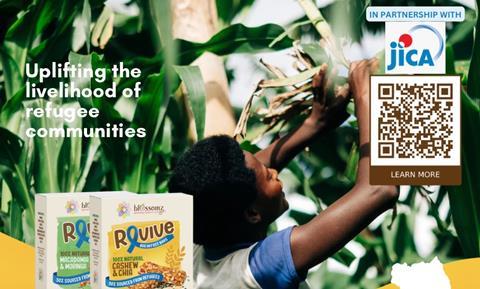Ugandan supplier launches breakfast bars containing tropical fruit and nuts from refugee communities

Ugandan agri-processor Zahra Food Industries has launched cereal bars made with ingredients sourced from refugee communities.
Available from Amazon.com in the US, the Blossomz Revive Breakfast Bars contain cereals, tropical fruits, nuts and honey. More than 50 per cent of the ingredients are sourced from refugee settlements in Uganda, thanks to collaboration with the Japan International Cooperation Agency (JICA).
There are two cereal bars available: Cashew & Chia (containing honey, peanuts, cashews, pineapple, corn flakes, pumpkin seeds, chia seeds and salt) and Macademia & Moringa (containing honey, peanuts, macadamia, mango, corn flakes, pumpkin seeds, sesame seeds, oats, moringa and salt).
“At Zahra Food Industries, we firmly believe that addressing social impact requires substantial, structural change rather than merely addressing surface symptoms,” said company founder Quresh Fidahusein.
“Through this transformative Travel Beyond Bars project, we are committed to empowering refugee communities, providing them with sustainable opportunities for economic self-reliance and thereby contributing to their long-term resilience and wellbeing.”
Fidahusein added: “Forced displacement is the defining social crisis of our era. Every morning we wake up, there are 15,000 more people forcibly displaced due to conflicts and other emergencies.
“The total number of refugees worldwide exceeded over 100 million in 2022, more than double the 42.7 million people who remained forcibly displaced a decade ago and the most since World War II.
“If current trends continue, the refugee crisis is projected to increase to over 300 million by 2030. Uganda alone hosts about 1.5 million refugees, the third highest of any country globally.”
The situation is compounded by the fact that as the refugee crisis peaks, funding has dipped due to other competing global events such as Covid-19, the Russia-Ukraine and Israel-Gaza conflicts.
In Uganda this has led to a decline in the amount of money and land allocated to support refugees. There is therefore a growing interest among governments and international organisations in the private sector as an alternative source of funding and support.
Refugees in Uganda widely engage in agricultural activities since the country’s key settlement strategy is to allocate parcels of land to steer people to self-reliance.
However, a private sector initiative that centres on value addition within agriculture is innovative and has the potential to make a wider-scale impact.
To begin with, Zahra is working with refugees and their host communities at the Kyangwali Refugee Settlement on the shores of Lake Albert. The settlement spans 35 square miles and houses about 130,000 refugees, mainly from the neighbouring Democratic Republic of Congo, who have fled ethnic violence and general insecurity.
Although agriculture is the most widespread economic activity in the area, refugees are more likely to be subsistence rather than commercial farmers because of the small plot sizes allocated to them.
The Ugandan government, together with the support of other donor agencies, is focused on boosting yields and establishing farmer groups that are given additional land. These types of interventions allow for the sourcing of ingredients for the Travel Beyond Bars project.
Zahra Food Industries is inviting individuals, organisations and stakeholders to join in with the project. Click here for more information.



